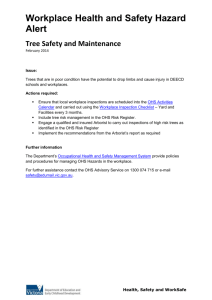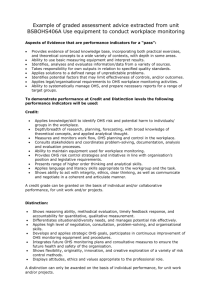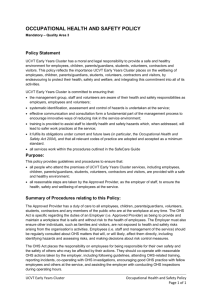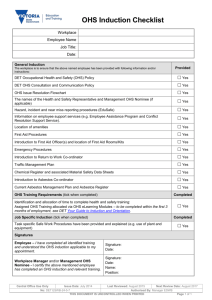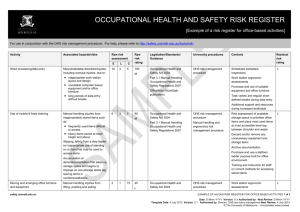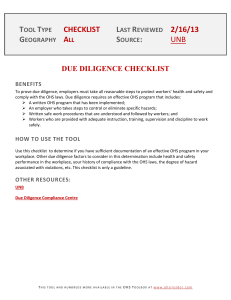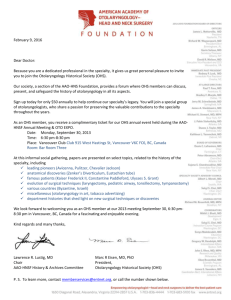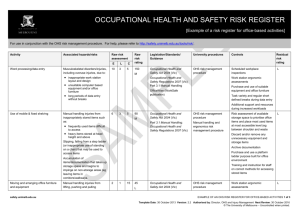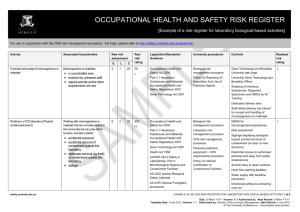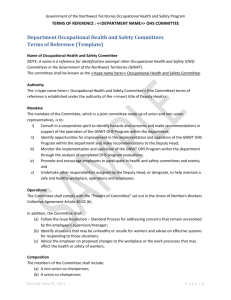Where the nurse gets hurt
advertisement
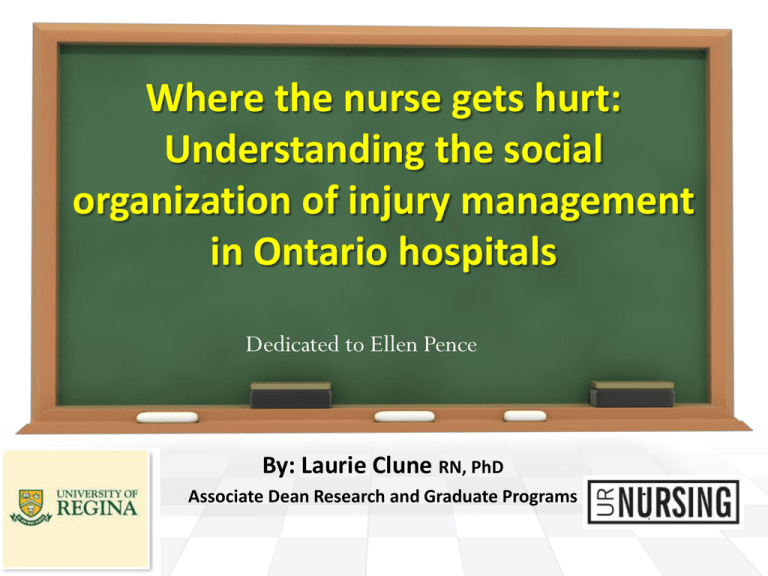
Where the nurse gets hurt: Understanding the social organization of injury management in Ontario hospitals Dedicated to Ellen Pence By: Laurie Clune RN, PhD Associate Dean Research and Graduate Programs What to expect in this presentation 1 2 To building from my doctoral work and develop a program of research To discuss how IE approaches can be used in research teams •My doctoral work Boss text Professional discourses and Ideologies Early Return to work The social organization of health care The social organization nursing work The Injured Nurse •Early Return to Work Domestic Work Rehab Work Accommodation Work • Experienced nurses are being removed terminated from their jobs. • Boss text: Ontario Workplace safety and insurance board act • If after 2 years you fail to return to your preinjury position the employer can terminate Occupational health nurse 1 (3, 4) “Working in a hospital (OHS department) is totally different than working in private industry”. Post Doc ?!#%* • The Institute for Work and Health 1. Primarily quantitative researchers (STATS, STATS, STATS and boot strapping ), economic evaluation, epidemiologic, and systematic review approaches 2. Non- nurse researchers doing research about nurses The Project Collaboration: Co-PI An economist - “I like your maps!” Funder: Workplace Safety and Insurance Board of Ontario Research Advisory Council Title: OHS economic evaluation resource needs for the health care sector in Ontario •The Grant •This project Worker Compensation Legislation Discourse of abuse A nurses body must be an able body The social organization nursing work Decision making in health care surrounding occupational health •Methodology • An exploratory approach using schema mapping, indepth in person interviews and telephone interviews • Stakeholder guides (n=10) • Who to ask : purposive sampling • What to ask: Initial interview guide • Where to ask: create connections • What are we seeing: refining interview guide, immersion and crystalization Stakeholder guide map: How does it work? Data discovery approaches INTERVIEWS • • • In person n = 20 • 22 informants Telephone n= 25 • 28 informants Roles • OHS operations • OHS directors, managers • OHS coordinators • Senior VP SITES • • • • • • • Hospitals Long term care Community nursing Ministry of Health Urban and rural Size (> 10,000, under 250) Speciality hospitals (children, cancer, orthopaedics) Scaffold map: Guiding the interview Idea for OHS initiative Planning Decision-making Implementation Evaluation There’s a difference NOT FOR PROFIT VS FOR PROFIT Scaffold map: Creating Work • Incident • Idea for OHS initiative reporting trends Technology tracking Prevention hunches Health Promotion Months (Jan= quit smoking; Feb = heart; March = nutrition) Scaffold map: Planning Work • Business plan for the board Benefits to patients • Budget • Planning DECISION MAKING: “I am not sure. It goes to the Board. I have no idea how they make the decision” How decisions are made? • Initiatives that have a direct effect on improving patient outcomes • Eg: • flu shot Ministry directives (labour and health) • Eg: harassment, over bed lifts • Most initiatives generated from OHS department • “no money” •This project Worker Compensation Legislation Discourse of abuse Ontario Hospital Act (funding) A nurses body must be an able body The social organization nursing work Decision making in health care surrounding occupational health •Hospital funding mechanisms Hospitals are funded for patient care and capital initiatives only Hospital funding is based on a comparative approach based on Facility size Case types codes Lengths of stays Key performance indicators (eg: infection rates, wait times) Hospitals that perform well are rewarded financially No funds are allocated from the Ministry for occupational health and safety Going back to the occupational health nurses’ comments: “Working in a hospital (OHS department) is totally different than working in private industry”. Money for occupational health and safety initiatives are not a part of funds received by hospitals. • OHS initiatives that do take place in hospitals are • • • Mandated by the Ministry of health or labour To protect the patient Thank you
